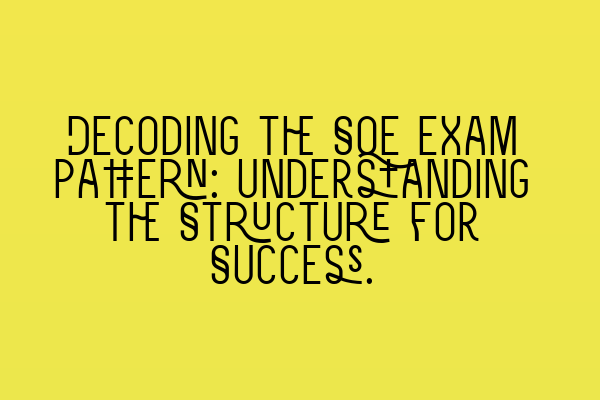Decoding the SQE Exam Pattern: Understanding the Structure for Success
Preparing for the Solicitors Qualifying Exam (SQE) requires a thorough understanding of its exam pattern and structure. By decoding the exam pattern, you can develop an effective study strategy that will maximize your chances of success. In this article, we will discuss the SQE exam pattern in detail and provide valuable insights to help you approach the exam with confidence.
The Structure of the SQE Exam
The SQE exam consists of two stages: SQE1 and SQE2. Each stage tests different skills and knowledge areas. Let’s take a closer look at the structure of each stage:
SQE1: Assessing Functioning Legal Knowledge
SQE1 is a multiple-choice exam that assesses your functioning legal knowledge. This stage is divided into two parts:
- Functioning Legal Knowledge: This part tests your understanding of the core legal principles and concepts across various areas of law.
- Practical Legal Skills: This part evaluates your ability to apply legal knowledge to real-world scenarios, covering tasks such as legal research, legal writing, and drafting.
It is essential to have a solid foundation of legal knowledge and practical skills to excel in this stage. Collaborative learning through an SQE exam study group can be highly beneficial in preparing for this exam.
Click here to learn more about the advantages of participating in an SQE exam study group.
SQE2: Assessing Practical Legal Skills
SQE2 focuses on assessing your practical legal skills through a series of written and oral assessments. This stage tests your ability to apply legal knowledge to real-life situations, demonstrating your competence as a solicitor. SQE2 is further divided into three components:
- Oral Skills Assessment: In this component, you will be assessed on your ability to communicate effectively and professionally as a solicitor.
- Written Skills Assessment: This component evaluates your written communication skills, including legal drafting, analytical reasoning, and problem-solving.
- Legal Research and Reasoning Assessment: This component tests your ability to conduct legal research, analyze complex legal issues, and provide well-reasoned solutions.
Developing strong practical legal skills is crucial for success in SQE2. Taking a systematic approach and practicing sample questions can significantly enhance your performance.
How to Approach the SQE Exam
Now that we have examined the structure of the SQE exam, let’s explore some effective strategies to approach the exam:
1. Understand the Exam Format:
Before diving into studying, take the time to understand the format and structure of each stage of the exam. This will help you plan your study schedule and allocate sufficient time for each section.
Here, you can find a comprehensive guide on the SQE exam format and structure.
2. Create a Study Plan:
Developing a study plan is crucial for effective exam preparation. Break down your study material into manageable chunks and allocate specific time slots for each topic. Be sure to include regular revision sessions to reinforce your learning.
3. Focus on Core Legal Principles:
The SQE exam tests your understanding of core legal principles and concepts. Prioritize studying these foundational areas to build a strong knowledge base. Use comprehensive study resources to cover all topics systematically.
4. Practice Sample Questions:
Practice makes perfect! Completing sample questions and past exam papers is an excellent way to familiarize yourself with the exam format, improve your time management skills, and identify areas that need further attention.
5. Seek Professional Guidance:
Consider seeking guidance from experienced solicitors or professional SQE tutors who can provide valuable insights, tips, and techniques to excel in the exam. They can also offer personalized feedback on your performance and help you identify areas for improvement.
6. Take Care of Yourself:
Remember to prioritize your well-being during the exam preparation period. Get enough sleep, exercise regularly, and maintain a healthy diet. Taking care of your physical and mental health will ensure optimal focus and concentration during the exam.
Conclusion
Understanding the structure and pattern of the SQE exam is essential to succeed in this rigorous assessment. By decoding the exam pattern and following effective study strategies, you can confidently approach the exam, knowing that you have prepared thoroughly. Remember to stay focused, practice regularly, seek professional guidance when needed, and take care of yourself throughout the exam preparation journey.
For more information about the SQE exam and other related topics, check out the following articles:
- Comparative Analysis: Delaware LLCs vs UK Companies
- The Ultimate Guide to SQE Exam: Everything You Need to Know
- Ethical Challenges in International Law: Balancing Legal and Moral Obligations

Leave a Reply